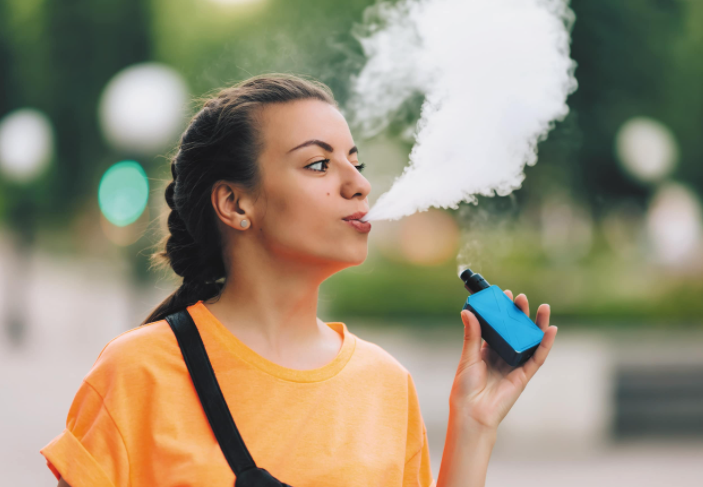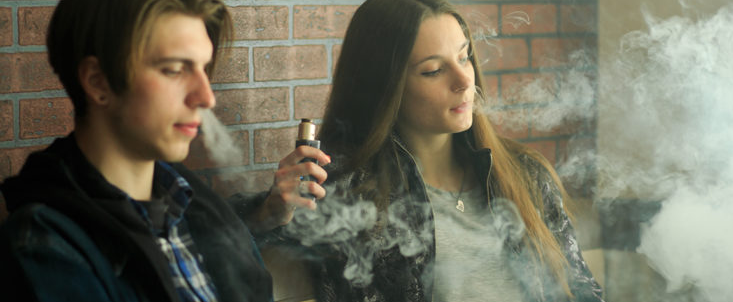|
Written by: Dachel Fohne Hot Topics/ Activism In a report released by the Centers For Disease Control and Prevention on September 9, 2020, the use of electronic cigarettes in high schoolers has decreased 7.9% (1.09 million teenagers) as compared to 2019. The new statistics prove an accomplishment for a culture heavily reliant on substances. Though, whether or not these numbers will last is a tale only time will tell. Popular media and music consistently seem to glorify the use of drugs, especially with upcoming genres such as emo rap that suggest self medicating through intoxication and musicians dying from overdoses. Pop culture has nearly desensitized society to a life revolving around the normalization of drugs. It is understandable as to why teenagers would think it would be a good idea to explore what drugs could possibly do to ease their problems. The CDC found that the main reason (55.3%) why middle and high school students tried vaping was due to being curious about it. Along with the influences to do drugs, there are also constantly new reasons for teenagers to feel the need to use illegal substances. For many people, substance use is seen as a way to escape reality. As we all know, 2020 has been a chaotic year with political crossfire, social reform, Covid-19 itself, and laws changing daily on how to handle living amidst the pandemic. So much change will inevitably cause unique turmoil for each generation. A May 2020 study done by National 4–H Council and The Harris Poll of 1,516 13-19 year olds showed that 81% believed mental health is a crisis in the United States and 70% had personally faced mental health challenges. Major stressors in their current life included school work (71%), future uncertainty (65%), and newfound loneliness (61%). Naturally, we humans try to find ways to cope with our problems. However, when we feel unable to express the way we feel about our problems to others we try to help ourselves. The Harris Poll even reported 67% of teens feeling pressured to keep their feelings to themselves, and another 67% feeling the need to act happy for others not to worry about them. Coincidentally, 37% of teens surveyed felt the need to worry about their friends trying smoking/vaping, while 15% admitted to using an increase of drugs to cope with their stress. Why did the CDC’s number of teenage vapers decrease in times of such influence and stress? A possible factor includes the lack of access to e-cigarettes, considering the main source of access to these devices often come from friends or sellers. Ever since quarantine orders and online learning, social interaction has been significantly reduced. Technically for the time being there are less teenagers resorting to trying vaporized nicotine. On the other hand, for teenagers who continue to have access to e-cigarettes, the burden of all these new stressors have already proved costly. 61.4% of the high schoolers who vape that were surveyed by the CDC in 2020 have either reported 20+/30 days of use or daily use of an e-cigarette. This number of addicts have foreshadowed a potential downfall in the future of stressed teenagers. When life returns to normal where teens can go back to school and parents allow their children to hangout with others, the numbers of those who vape will most likely spike again. The 2018 National Youth Tobacco Survey calculated 72.6% of middle and high schoolers obtained their e-cigarette through another peer, while 26.3% said they had bought their e-cigarette from a vape shop or convenience store. During the coronavirus pandemic, it may be difficult to have physical contact with peers, but the occurrence of underage controlled substance sales have recently been on a rise. Teenagers have been taking advantage of mandatory mask orders, and some have even gone viral for doing so. The 2018 study had also found that only 25% of teens who tried to buy from a shop or store were declined. In times of economic hardship, it is predictable that businesses will allow more underage tobacco sales to keep their business from closing. Despite the uplifting news that vaping has become less of an outlet for teenagers, the decline in mental health due to the current state of the world could very likely mean an uptick in teenage vapers next year. If you or someone you know is struggling with addiction or mental health, please reach out to the Substance Abuse and Mental Health Services Administration National Hotline (SAMHSA): 1-800-662-4357. -- Dachel Fohne, Author
0 Comments
Leave a Reply. |




 RSS Feed
RSS Feed
